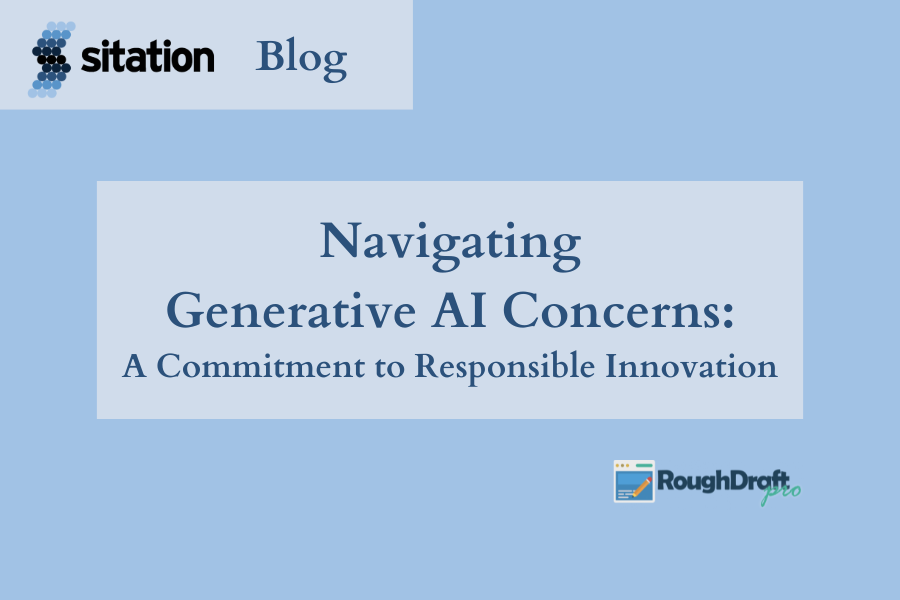Generative artificial intelligence (AI) has made remarkable strides, opening up new possibilities across industries. From content creation to problem-solving, the new technology has shown immense potential. However, it’s essential to acknowledge and address the legitimate concerns that arise as we venture further into this innovative landscape. In this blog post, we’ll delve into the common concerns associated with generative AI and how we’re dedicated to mitigating these issues for a responsible, secure, and ethical approach.
1. Misinformation
Misinformation is a critical concern when it comes to generative AI. There’s a potential for the technology to create content that might spread false or misleading information. RoughDraftPro is designed for, and used exclusively with, client-sourced information, so the risk of spreading misinformation is very, very low. However, generative AI is known to occasionally hallucinate, that is, to invent information or facts that are not accurate. To tackle this, we ensure that our artificial intelligence prompts undergo rigorous validation processes to minimize the likelihood of AI hallucinations. We are also able to run our AI-generated content through fact and claim-checking automations to ensure a high degree of accuracy before the content is used.
2. Privacy and Security Risks
 Privacy and security are non-negotiable aspects of any AI-driven solution. We understand the importance of safeguarding sensitive data. To start, we only request information from our clients that is needed to fulfill their content needs; we never solicit or handle personally identifiable information (PII) for use with our AI solutions. Our commitment to privacy also includes the use of private API access with OpenAI, ensuring that our data is not shared with other OpenAI customers or the public-facing ChatGPT. Additionally, according to OpenAI, “[a]ny data sent through the API will be retained for abuse and misuse monitoring purposes for a maximum of 30 days, after which it will be deleted (unless otherwise required by law).”
Privacy and security are non-negotiable aspects of any AI-driven solution. We understand the importance of safeguarding sensitive data. To start, we only request information from our clients that is needed to fulfill their content needs; we never solicit or handle personally identifiable information (PII) for use with our AI solutions. Our commitment to privacy also includes the use of private API access with OpenAI, ensuring that our data is not shared with other OpenAI customers or the public-facing ChatGPT. Additionally, according to OpenAI, “[a]ny data sent through the API will be retained for abuse and misuse monitoring purposes for a maximum of 30 days, after which it will be deleted (unless otherwise required by law).”
3. Unintended Consequences
Unintended consequences can arise when AI models generate content without appropriate oversight. To address this concern, we’ve implemented a robust approval process for generated content. Before deployment, all content is reviewed and approved by human experts who evaluate accuracy, bias, and authenticity of voice. This hands-on approach minimizes the potential for unintended outcomes.
4. Copyright Issues
Copyright concerns can emerge when AI-generated content blurs the lines between original and machine-created work. At our core, we believe that clients should retain ownership of the content generated using our technology. We ensure that clients have the copyright of the produced content, empowering them to use and protect their creations as they see fit.
5. Perpetuation of Biases
AI models are only as unbiased as the data they are trained on. To address bias concerns, we are transparent about the technology we use and the data sources we draw from. We actively work on reducing biases in our AI prompts, and we rely on human experts to carefully curate training data. This approach helps us create AI models that are more inclusive and representative.
6. Transparency and Authenticity
Transparency is paramount in the world of AI. We are open about the technologies we utilize, ensuring that our clients have a clear understanding of the AI’s capabilities and limitations. Moreover, our commitment to authenticity means that we employ individuals to create prompt models. These experts are responsible for verifying accuracy, authenticity of voice, and bias-free content, ensuring that the AI generates content that aligns with our client’s values.
7. Customization and Control
Our dedication to addressing concerns extends to giving clients full control over the generated content. We offer a unique advantage by creating custom prompt models that are dedicated to a single client, and are not viewable or usable by other clients. This ensures that your AI-generated content remains exclusive to your brand and aligned with your distinct identity.
In conclusion, while the potential of generative AI is immense, we recognize the importance of addressing the valid concerns that surround its usage. By leveraging dedicated private APIs, transparent technology, human approval processes, and strict privacy measures, we are committed to responsible innovation. Our goal is to empower clients with AI-generated content that is accurate, authentic, and aligned with their values, while also ensuring the highest standards of privacy, security, and ethical practice. Together, we can harness the power of generative AI for a brighter future while keeping these concerns in check.
Learn More About Generative AI
For further information about how generative AI works, we recommend taking this free AI training course provided by Google. To learn more about preparing your business for embracing AI, we recommend this article by the Harvard Business Review.
Contact Us to learn more about how to start your company’s journey in to Generative AI product content.




